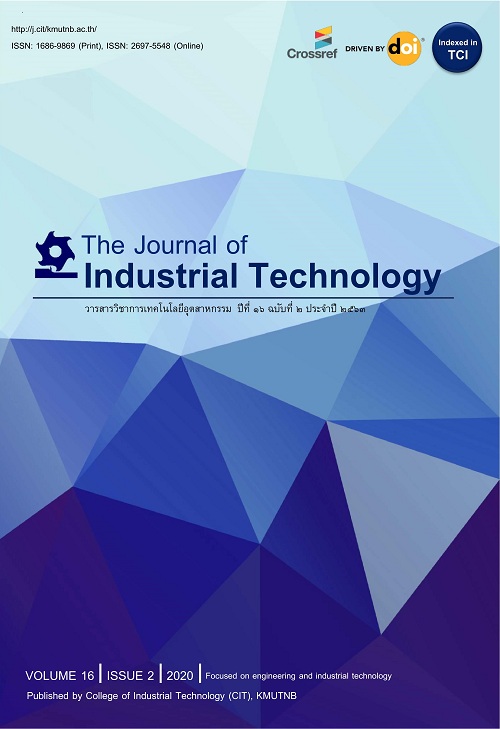Effect of Injection Pressure and Timing of the Ternary Blends (Ethanol-Biodiesel-Diesel) on Combustion Characteristics
Abstract
This research studies the combustion characteristics of a compression ignition engine when using ternary blends (ethanol-biodiesel-diesel). Because ethanol is renewable energy and can lower exhaust emissions, it is interesting to use in a diesel engine. With less effort to prepare the fuel and apply it in the engine, the blending technique is used in this research. However, phase separation readily occurs as the percentage of ethanol increases and at the low ambient temperature. Fortunately, biodiesel has been used commercially as a blend and can act as a surfactant to keep the phase stable. To comply with the market, the blend ratio used is B3E5, B7E5, and B10E10, where B stands for biodiesel, E is ethanol, and the numeric presents the percent of each fuel by volume. In addition, diesel adding 3 percent biodiesel as a lubricity enhancer is used as the reference. Combustion features such as heat release rate, ignition delay, and mass fraction burned derived from in-cylinder pressure are experimented with through a single-cylinder common-rail diesel engine. The injection pressure varies from 500, 700, and 1000 bar, while injection timing adjusts from 335, 340, 345, 350, and 355°CA. With ethanol concentration, the ignition commences earlier than diesel B3 due to the puffing phenomena. However, adding more biodiesel content results in later ignition because of the difficulty of the fuel-air mixing process. The high content of ethanol and biodiesel yields the lengthiest ignition delay.
Keywords
[1] J. Mączyńska, M. Krzywonos, A. Kupczyk, K. Tucki, M. Sikora, H. Pińkowska, A. Bączyk and I. Wielewska, Production and use of biofuels for transport in Poland and Brazil – The case of bioethanol, Fuel, 2019, 241, 989-996.
[2] https://www.eia.gov/energyexplained/biofuels/biodiesel-rd-other-use-supply.php. (Accessed on 22 April 2023)
[3]Sahara, A. Dermawan, S. Amaliah, T. Irawan and S. Dilla, Economic impacts of biodiesel policy in Indonesia: A computable general equilibrium approach, Economic Structures, 2022, 11, 22.
[4] X. Wang, C. Geng, J. Dong, X. Li, T. Xu, C. Jin, H. Liu and B. Mao, Effect of diesel/PODE/ethanol blends coupled pilot injection strategy on combustion and emissions of a heavy duty diesel engine, Fuel, 2023, 335, 127024.
[5] J. Lee, S. Lee and S. Lee, Experimental investigation on the performance and emissions characteristics of ethanol/diesel dual-fuel combustion, Fuel, 2018, 220, 72-79.
[6] M.A. Shaikh and V. R. Patel, Experimental studies on ethanol solubility and nanoparticle (NP) stability in diesel fuel, Chemical Engineering Research and Design, 2022, 188,105-129.
[7] C. Jin, X. Zhang, X. Wang et al., Effects of polyoxymethylene dimethyl ethers on the solubility of ethanol/diesel and hydrous ethanol/diesel fuel blends, Energy Science and Engineering, 2019, 7, 2855-2865.
[8] C. Jin, X. Zhang, Z. Geng, X. Pang, X. Wang, J. Ji, G. Wang and H. Liu, Effects of various co-solvents on the solubility between blends of soybean oil with either methanol or ethanol, Fuel, 2019, 244, 461-471.
[9] N. Kumar, R. Koul and R.C. Singh, Comparative analysis of ternary blends of renewable Diesel, diesel and ethanol with diesel, Sustainable Energy Technologies and Assessments, 2022, 50, 101828.
[10] S. Pinzi, I. López, D.E. Leiva-Candia, M.D. Redel-Macías, J.M. Herreros, A. Cubero-Atienza and M.P. Dorado, Castor oil enhanced effect on fuel ethanol-diesel fuel blend properties, Applied Energy, 2018, 224, 409-416.
[11] S. Madiwale, A. Karthikeyan and V. Bhojwani, Properties investigation and performance analysis of a diesel engine fuelled with Jatropha, Soybean, Palm and Cottonseed biodiesel using ethanol as an additive, Materials Today: Proceedings, 2018, 5(1), 657–664.
[12] M. Vergel-Ortega, G. Valencia-Ochoa and J. Duarte-Forero, Experimental study of emissions in single-cylinder diesel engine operating with diesel-biodiesel blends of palm oil-sunflower oil and ethanol, Case Studies in Thermal Engineering, 2021, 26, 101190.
[13] V. Kulanthaivel, A. Jayaraman, T. Rajamanickam and S. Selvam, Impact of diesel-algae biodiesel-anhydrous ethanol blends on the performance of CI engines, Journal of Cleaner Production, 2021, 295, 126422.
[14] M.M. El-Sheekh, M.Y. Bedaiwy, A.A. El-Nagar, M. ElKelawy and H.A. Bastawissi, Ethanol biofuel production and characteristics optimization from wheat straw hydrolysate: Performance and emission study of DI-diesel engine fueled with diesel/biodiesel/ethanol blends, Renewable Energy, 2022, 191, 591-607.
[15] H.V. Srikanth, Sharanappa G, B. Manne and S. Bharath Kumar, Niger seed oil biodiesel as an emulsifier in diesel-ethanol blends for compression ignition engine, Renewable Energy, 2021, 163, 1467-1478.
[16] T. Prakash, V. Edwin Geo, L.J. Martin and B. Nagalingam, Effect of ternary blends of bio-ethanol, diesel and castor oil on performance, emission and combustion in a CI engine, Renewable Energy, 2018, 122, 301-309.
[17] S.N. Bhat, S. Shenoy and P. Dinesha, Effect of bio-ethanol on the performance and emission of a biodiesel fueled compression ignition engine, MATEC Web of Conferences, 2018, 144, 04017.
[18] D. Qi, L. Ma, R. Chen, X. Jin and M. Xie, Effects of EGR rate on the combustion and emission characteristics of diesel-palm oil-ethanol ternary blends used in a CRDI diesel engine with double injection strategy, Applied Thermal Engineering, 2021, 199, 117530.
[19] J. Cong Ge, G. Wu, B. Yoo and N. Jung Choi, Effect of injection timing on combustion, emission and particle, morphology of an old diesel engine fueled with ternary blends at low idling operations, Energy, 2022, 253, 124150.
[20] L. Zuo, J. Wang, D. Mei, S. Dai and D. Adu-Mensah, Experimental investigation on combustion and (regulated and unregulated) emissions performance of a common-rail diesel engine using partially hydrogenated biodiesel-ethanol-diesel ternary blend, Renewable Energy, 2022, 185, 1272-1283.
[21] P. Karin, A. Tripatara, P. Wai, B. Oh, C. Charoenphonphanich, N. Chollacoop and H. Kosaka, Influence of ethanol-biodiesel blends on diesel engines combustion behavior and particulate matter physicochemical characteristics, Case Studies in Chemical and Environmental Engineering, 2022, 6, 100249.
[22] S. Shamun, G. Belgiorno, G.D. Blasio, C. Beatrice and M. Tuner, Performance and emission of diesel-biodiesel-ethanol blends in a light duty compression ignition engine, Applied Thermal Engineering, 2018, 145, 444-452.
[23] M. Mukhtar, F.Y. Hagos, A.R.A. Aziz, A.A. Abdulah and Z.A.A. Karim, Combustion characteristics of tri-fuel (diesel-ethanol-biodiesel) emulsion fuels in CI engine with micro-explosion phenomenon attributes, Fuel, 2022, 312, 122933.
[24] M.J. Troughton, Handbook of plastics joining: A practical guide, 2nd Ed., William Andrew Inc., NY, USA, 2018.
[25] J. Barata, Modelling of biofuel droplets dispersion and evaporation, Renewable Energy, 2008, 33, 769-779.
[26] S. Sundarapandian, Performance and emission analysis of biodiesel operated CI engine, Journal of Engineering, Computing and Architecture, 2007, 1(2), 1–22.
[27] A. Zanier and HW. Jäckle, Heat capacity measurements of petroleum fuels by modulated DSC, Thermochimica Acta, 1996, 287(2), 203–212.
[28] NIST Standard Reference Database Number 69, Chemistry webbook, Standard Reference Data Program, National Institute of Standards and Technology (NIST), 2016.
[29] W.M. Haynes, Handbook of chemistry and physics, Taylor and Francis Group, Boca Raton, FL, USA, 2015–2016, pp. 7-9.
[30] J. B. Heywood, Internal combustion engine fundamentals, McGraw-Hill Inc, NY, USA, 1988.
[31] Z. Huang, H. Lu, D. Jiang, K. Zeng, B. Liu, J. Zhang and X. Wang, Combustion behaviors of a compression-ignition engine fuelled with diesel/methanol blends under various fuel delivery advance angles, Bioresource Technology, 2004, 95, 331-341.
[32] F. Juric, Z. Petranovic, M. Vujanovic, T. Katrasnik, R. Vihar, X. Wang and N. Duic, Experimental and numerical investigation of injection timing and rail pressure impact on combustion characteristics, Energy Conversion and Management, 2019, 185, 730-739.
[33] R. Payri, G. Bracho, J.A. Soriano, P. Fernández-Yáñez and O. Armas, Nozzle rate of injection estimation from hole to hole momentum flux data with different fossil and renewable fuels, Fuel, 2020, 279, 118404.
[34] Z. Wang, S. Wu, Y. Huang, S. Huang, S. Shi, X. Cheng and R. Huang, Experimental investigation on spray, evaporation and combustion characteristics of ethanol-diesel, water-emulsified diesel and neat diesel fuels, Fuel, 2018, 231, 438-448.
[35] A. M. Faik and Y. Zhang, Multicomponent fuel droplet combustion investigation using magnified high speed backlighting and shadowgraph imaging, Fuel, 2018, 221, 89-109.
Refbacks
- There are currently no refbacks.






